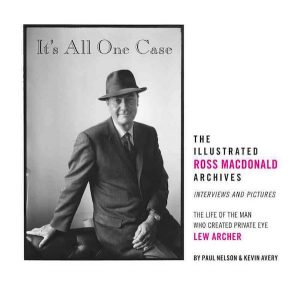 Loneliness and frustration
Loneliness and frustration
We both came down with an acute case
When the lights came up at two
I caught a glimpse of you
And your face looked like something
Death brought with him in his suitcase
—Warren Zevon, “The French Inhaler”
I don’t exactly know why I took Kevin Avery and Jeff Wong’s It’s All One Case: The Illustrated Ross Macdonald Archives off the shelf the other day. Truth to tell, no reason is needed; anyone who’s seen this marvelous tome knows that it’s a continuing source of wisdom and delight, well worth dipping into at any point in time.
A bit of background might be helpful for the uninitiated. In 1976, journalist Paul Nelson recorded almost 50 hours of interviews with Ken Millar, better known as detective novelist Ross Macdonald, for a Rolling Stone article. The article never happened, and the tapes languished. Macdonald died of Alzheimer’s Disease in 1983. Nelson died in 2006.
Kevin Avery, a writer who venerates Nelson, published Everything Is an Afterthought: The Life and Writings of Paul Nelson, in 2011, bringing the critic and his work newfound attention and respect. Avery was approached by artist and illustrator Jeff Wong, a friend of Nelson’s and the owner of an extensive collection of material (books, manuscripts, letters, etc.) by and about Macdonald. Wong had a transcript of the 1976 interviews. Would Avery like to read them?
Avery said yes, and the result, ultimately, was It’s All One Case. Avery skillfully edited the interviews. Wong selected hundreds of mouth-watering items from his collection and designed the coffee-table-sized volume for Fantagraphic Books. Visually stunning, intellectually provocative, Case is a triumph. Flipping through its pages, the reader finds gem after gem.
Discussing Mickey Spillane and his followers, Nelson observed: “It seemed like the hardboiled style went into excess very fast.”
Macdonald answered: “Well, it’s very hard to keep it clean, to keep it morally clean, because simplicity is the most difficult of all tools to use. When you’re writing what purports to be the spoken word, you’re constantly having to differentiate between what’s valid and what’s ephemeral . . . Most slang dies, for example, so you have to be very careful. You really have to write a purer style in a sense than the literary writers write; and I think Hammett does write a purer style than most of his literary contemporaries. His style in his best work is amazingly pure and accurate and simple. Well, that’s not what I aim at, of course. I don’t aim at simplicity.”
Nelson: “Do you think you’re a prisoner of complexity in a way?”
Macdonald: “Yes, but a willing prisoner. It’s sort of a happy imprisonment, though, to be imprisoned in something that you’ve made yourself.”
Readers familiar with Macdonald’s staggeringly complicated plots will agree: It’s a pleasure to be caught in his imaginative web.
I could quote at length from Nelson and Macdonald’s conversations, but — like Macdonald’s novels — the cumulative effect is more powerful than any given moment, striking as it may be.
The last decade has been good to Macdonald. His books are back in print. A number of his works have been included in the prestigious Library of America series. Meanwhile There Are Letters, a collection of his correspondence with Eudora Welty was published in 2015. His reputation, which had declined in the years following his death, is once again on the rise. The reputation of Margaret Millar, Macdonal’s wife, is also on the upswing, and her works are now available from Syndicate Books. Jeff Wong designed the covers for the Millar re-issues.
Warren Zevon was a rabid fan of Macdonald’s. (For more details, see Nelson’s piece on the singer-songwriter in Everything Is Afterthought.) Zevon never achieved his goal of writing a detective novel, but he drew from the hardboiled perspective time and again in his songs. I’ve always liked the lined quoted at the top of these remarks, and you can hear them here:
 — Joseph Goodrich
— Joseph Goodrich
Joseph Goodrich is an Edgar Award-winning dramatist whose plays have been produced across the country. His fiction has appeared in Ellery Queen’s Mystery Magazine, Alfred Hitchcock’s Mystery Magazine, and Noir Riot. His most recent play, an adaptation of Rex Stout’s Might As Well Be Dead, recently closed a successful run in St. Paul, Minnesota.
